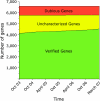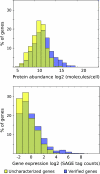Why are there still over 1000 uncharacterized yeast genes?
- PMID: 17435240
- PMCID: PMC1893027
- DOI: 10.1534/genetics.107.074468
Why are there still over 1000 uncharacterized yeast genes?
Abstract
The yeast genetics community has embraced genomic biology, and there is a general understanding that obtaining a full encyclopedia of functions of the approximately 6000 genes is a worthwhile goal. The yeast literature comprises over 40,000 research papers, and the number of yeast researchers exceeds the number of genes. There are mutated and tagged alleles for virtually every gene, and hundreds of high-throughput data sets and computational analyses have been described. Why, then, are there >1000 genes still listed as uncharacterized on the Saccharomyces Genome Database, 10 years after sequencing the genome of this powerful model organism? Examination of the currently uncharacterized gene set suggests that while some are small or newly discovered, the vast majority were evident from the initial genome sequence. Most are present in multiple genomics data sets, which may provide clues to function. In addition, roughly half contain recognizable protein domains, and many of these suggest specific metabolic activities. Notably, the uncharacterized gene set is highly enriched for genes whose only homologs are in other fungi. Achieving a full catalog of yeast gene functions may require a greater focus on the life of yeast outside the laboratory.
Figures





References
-
- Alexandrov, A., I. Chernyakov, W. Gu, S. L. Hiley, T. R. Hughes et al., 2006. Rapid tRNA decay can result from lack of nonessential modifications. Mol. Cell 21: 87–96. - PubMed
-
- Bader, G. D., A. Heilbut, B. Andrews, M. Tyers, T. Hughes et al., 2003. Functional genomics and proteomics: charting a multidimensional map of the yeast cell. Trends Cell Biol. 13: 344–356. - PubMed
-
- Blandin, G., P. Durrens, F. Tekaia, M. Aigle, M. Bolotin-Fukuhara et al., 2000. Genomic exploration of the hemiascomycetous yeasts: 4. The genome of Saccharomyces cerevisiae revisited. FEBS Lett. 487: 31–36. - PubMed
Publication types
MeSH terms
LinkOut - more resources
Full Text Sources
Other Literature Sources
Molecular Biology Databases

